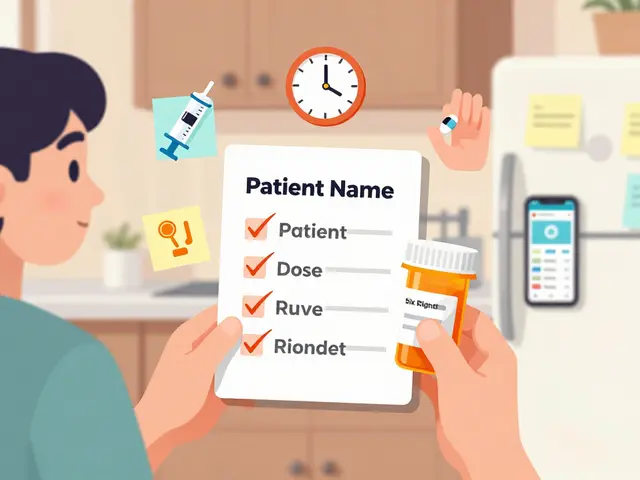If you or someone you know deals with type 2 diabetes, you’ve probably heard the name Actos thrown around in the doctor’s office. But what’s lurking behind that simple name? Actos, or pioglitazone, is more than just a pill on your prescription list—it’s a tool that’s quietly helping millions keep their blood sugar in check. Yet, there’s a whole lot more happening under the hood than you might think. Between its unique way of tackling insulin resistance and plenty of debate about its risks, this little tablet has quite a story to tell.
What Is Actos and How Does It Work?
Let’s get right to the basics: Actos, with the active ingredient pioglitazone, is a prescription med approved to treat type 2 diabetes. You won’t see it prescribed for type 1—the kind where the body doesn’t make insulin at all—but it often shows up when type 2 diabetes creeps out of your comfort zone and refuses to cooperate with diet and exercise alone. Since getting its green light from the FDA back in 1999, Actos has been used by millions worldwide to lower blood glucose.
So how does it get the job done? Pioglitazone falls into a drug class called thiazolidinediones—try saying that three times fast. Most folks (and doctors) just call them TZDs. They work by making your body more sensitive to its own insulin. Unlike drugs that pump out more insulin or force your pee to carry away extra sugar, Actos goes to the root of the issue: insulin resistance. It gets your muscle cells, liver, and fat tissue to listen to the insulin your body already makes, soaking up glucose out of your blood and tucking it away where it belongs. That’s a big deal because, for most adults with type 2, the problem isn’t always too little insulin—it’s that their bodies aren’t using it well.
Research from the National Institutes of Health shows that using Actos can bring down HbA1c (a test that shows your three-month average blood sugar) by about 0.7 to 1.3 percentage points. That may sound small, but for diabetics, every decimal point counts. Imagine trimming your risk for nerve, eye, and kidney troubles—all by ticking down that number. Plus, Actos doesn’t cause low blood sugar (hypoglycemia) on its own, unless you mix it with other meds that do. That means one less thing to worry about for many folks juggling multiple prescriptions.
But the way Actos works means it moves slowly. You’re not going to pop a pill today and see a miracle tomorrow. Most people wait weeks, sometimes months, before their blood sugar readings settle into a healthier zone. That’s why patience and sticking to your doctor’s schedule matter. If you’re tracking your numbers, don’t freak out if things don’t budge after the first week. Give it time—think marathon, not sprint.
Check out this quick snapshot of Actos compared to other common type 2 diabetes meds, just for context:
| Drug Name | Type | Main Action | Risk of Low Blood Sugar | Time to See Effect |
|---|---|---|---|---|
| Actos (Pioglitazone) | TZD | Improves Insulin Sensitivity | Low | Several Weeks |
| Metformin | Biguanide | Reduces Liver Sugar Production | Low | Few Days-Weeks |
| Glipizide | Sulfonylurea | Increases Insulin Secretion | High | 1-2 Hours |
| Jardiance (Empagliflozin) | SGLT2 Inhibitor | Removes Sugar via Urine | Low | Few Days |
One thing you might notice: TZDs like Actos aren’t usually the very first med your doctor will try. Doctors often start with metformin, which is cheap, safe, and gets the job done for a lot of people. If metformin isn’t enough, or if side effects get in the way, then Actos might step in as Plan B—or C. But the decision’s always personal: your own health history, other meds, and even your insurance can all tip the scales.

The Real-Life Experience: Side Effects, Benefits, and Myths
Ask a crowd of type 2 diabetics about Actos, and you’ll get a grab bag of stories—some good, some not-so-great. The benefits are clear: better blood sugar, less insulin resistance, and even some heart perks for people with specific conditions. For example, the PROactive study (a big international trial from the early 2000s) suggested that Actos might help lower risks for heart attack and stroke in folks with existing heart disease. That’s no small bonus, considering diabetes and heart trouble are often side-by-side on your medical chart.
Yet, Actos isn’t exactly the chill, drama-free friend everyone wants. There are some very real side effects. The most talked-about? Weight gain and fluid retention. A lot of people notice an extra pound here or there after a few months—sometimes more. Swelling in the ankles (called edema) can show up, especially if you’ve had heart failure in the past. For this reason, Actos isn’t recommended for folks with serious heart problems. If you’re at risk for heart failure, have that conversation with your doctor before starting it.
Here’s something more controversial: the bladder cancer debate. In the early 2010s, some studies hinted at a higher risk of bladder cancer in people taking Actos long-term. Regulators in France and Germany even pulled it off the market for a while. Follow-up studies, including a big one by Kaiser Permanente in California, suggest the risk, if it exists, is pretty dang small—about one extra case per 10,000 users each year. Still, it’s something to think about if you have a history of bladder cancer or pee problems.
Then there’s bone health. Actos might nudge up your risk for fractures, especially in older women. If you’re already worried about brittle bones, bring that up before you start. For most other people, regular bone-friendly habits (get enough calcium, walk often, catch some sunshine for vitamin D) are usually enough.
Let’s unpack some lesser-known facts and bust a few myths, shall we? First, Actos doesn’t cause low blood sugar alone. That’s a headache reserved for drugs like insulin or sulfonylureas, unless used in combo. Second, if you see your scale creeping up, it’s not just ‘fat’—much of the weight is water retention. You CAN counter this with salt control and regular movement. Third, Actos doesn’t fix diabetes overnight, and you absolutely can’t skip out on healthy habits like regular meals, real veggies, and daily steps—even if your blood sugar is looking perfect for now. Keep your diet simple: fewer carbs, more fiber, and drink water—not juice.
If you’re thinking about giving Actos a try, here are some tips straight from real users and healthcare pros:
- Take it at the same time each day. Consistency helps your body adjust—and your memory, too.
- Swallow with or without food, but if your stomach’s touchy, a snack can help.
- Watch for signs of fluid overload: sudden weight gain (2+ pounds overnight or in a few days), puffy feet, or trouble breathing. Call your doctor if these crop up.
- Don’t expect instant results. Your A1C and daily numbers will shift slowly—so be patient with yourself and your meds.
- Pair it with movement. Even a daily walk does wonders for blood sugar and helps counteract any unwanted weight gain.
- Get liver checks once or twice a year. Like some meds, Actos goes through your liver, and your doc will want to make sure it stays happy.
By the way, generic pioglitazone is just as effective as the name-brand Actos. You don’t have to pay extra unless your prescription plan insists—so always ask your pharmacist about the cheapest option. And if you ever need to stop Actos (maybe you’re switching meds, having surgery, or planning pregnancy), taper slowly if you can, with your doctor’s guidance. Sudden quits don’t usually cause trouble, but it’s always safer to check in first.

Actos in Context: Trends, Costs, and Smart Shopping
Actos isn’t alone on the diabetes scene. In the past ten years, newer drugs have entered the spotlight—think SGLT2 inhibitors (like Jardiance) or GLP-1 agonists (such as Ozempic). They come packed with some flashy perks, like heart protection and even weight loss, but they’re more expensive and not right for everyone. Actos, meanwhile, keeps humming along as a tried-and-tested workhorse, often at a fraction of the price.
As of 2025, the cost of generic pioglitazone at most big-box pharmacies hovers around $10-30 per month without insurance. The brand-name pill can set you back over $200 a month if you’re paying out of pocket, but almost all plans cover the generic. If cash is tight, ask about prescription discount cards or check third-party price finder websites before heading to your usual pharmacy. Coupon programs can shave off a few bucks, too—sometimes more than your insurance co-pay.
About 5% of people with type 2 diabetes in the U.S. used a TZD like Actos in 2023, based on data pulled from the American Diabetes Association. Most were middle-aged or older, and many took Actos along with other drugs. Combo therapy is common: metformin is nearly always step one, then comes Actos, sulfonylureas, or the newer expensive picks. Your insurance may require you to try cheaper options first—something called “step therapy”—so don’t be surprised if you have to negotiate a bit if your doctor wants something fancy or newer.
One surprising trend: researchers are looking at Actos for uses outside classic diabetes management—in conditions like nonalcoholic fatty liver disease and even certain types of polycystic ovary syndrome (PCOS). Results aren’t always rock solid yet, but it shows just how much doctors still value Actos’s unique knack for improving insulin sensitivity. Don’t use it off-label unless your endocrinologist is on board, but it’s cool to know its story doesn’t start and end with diabetes alone.
If you pick Actos as part of your regimen, keep it practical. Watch your numbers, track how you feel, and speak up about any weird symptoms that crop up—especially anything with your bladder, heart, or bones. Make time for check-ins with your med team twice a year, and bring your latest home glucometer log. It helps your doctor see the big picture, spot patterns, and keep you safe as you adjust or swap out meds.
People sometimes ask if Actos is ‘better’ than the rest. The honest answer? There’s no true winner—everybody’s diabetes behaves a little differently. If you’ve struggled with other drugs or want a steady, reliable fix (not chasing fads), Actos can fit beautifully. If you’re chasing weight loss, worried about your heart, or have bone density issues, you and your doctor might look at other picks. It’s about matching the drug set to your life, risks, and insurance realities.
Before you hop on—or off—the Actos train, weigh the facts, your health risks, and talk with the folks who know your medical history best. Above all, don’t fight your diabetes journey alone. Info is your best ally here, so keep asking questions, track what works, and stay flexible. Smart, steady steps beat quick fixes every time.



 Medications
Medications





Naomi Ho
July 18, 2025 AT 12:42Really great post on Actos and pioglitazone here. I think one of the most important things for people starting on this medication is understanding how it actually works in the body. Pioglitazone improves insulin sensitivity, so it doesn’t just lower blood sugar but helps the body use insulin better. This can make a huge difference for many with type 2 diabetes.
People often overlook side effects, but they are important to know about. While weight gain and edema are some common concerns, watching out for signs of heart failure is crucial. Regular check-ins with your healthcare provider can really help manage any risks early on.
Also, a pro tip is to take Actos with food to minimize stomach upset. Consistency matters a lot with diabetes medications. It’s good to pair this approach with a balanced diet and exercise.
Anybody else have experience with how Actos changed their treatment plans? Would love to hear more real-world insights.
Christopher Stanford
July 22, 2025 AT 18:00Ugh, gotta say, a lot of these diabetes drugs like Actos come with a laundry list of side effects that they kinda sweep under the rug. Yeah sure, it helps with insulin, but look, the weight gain side effect? Honestly, not cool.
And there’s been talk about bladder cancer risks, though they say it's low probability, still makes me paranoid every time I hear it. Like seriously, are these meds fixing the problem or just creating more? People should read the fine print before jumping on this bandwagon.
Anyone else feel like these pharma companies always hype these drugs way beyond what they actually deliver?
Steve Ellis
July 26, 2025 AT 23:18I can totally see where that skepticism is coming from, but I gotta say, when used properly, Actos has really changed outcomes for a lot of folks. Like we’re not living in a perfect world, but these medications are tools, not magical cures. Combining meds with lifestyle changes definitely makes a dramatic impact though.
Just don’t give up on the journey, right? The road to managing type 2 diabetes is full of ups and downs but every step forward counts!
Also wondering if anyone’s had any success with combining Actos with other meds like metformin? Curious about how that worked for you.
Jennifer Brenko
July 31, 2025 AT 02:00From a more clinical perspective, pioglitazone’s role in improving insulin sensitivity is well documented. However, one must be vigilant concerning its safety profile, especially regarding cardiovascular health. The edema and potential heart failure risk remain a significant concern in vulnerable populations.
In Canada, where I practice, we tend to prioritize alternatives before considering Actos, especially in patients with existing heart conditions. Has anyone else had to switch treatment protocols based on emerging research?
This medication demands ongoing evaluation by physicians considering patient history extensively.
Suzanne Podany
August 4, 2025 AT 04:11Love how this post brings a well-rounded view to such an important topic. Diabetes management can be complex, and I always encourage people to look beyond medications to their overall wellbeing.
It's so vital that individuals feel empowered with knowledge about what they're putting in their bodies and how it affects them uniquely. Every one’s experience differs, and that’s perfectly okay.
Sharing experiences here could really help others not feel so alone in their health journeys. Anyone here started on Actos recently and how have things been going from your perspective?
Harold Godínez
August 8, 2025 AT 07:13Man, just gotta say, I always mess up taking meds when I’m not careful. With Actos, the timing and consistency really matter, like taking it at the same time every day with food to avoid stomach issues. I personally found setting phone reminders super helpful.
Also referencing the latest studies I found online, combining Actos with lifestyle changes improves results exponentially. Just popping the pill alone isn’t enough.
Anyone got good tips for staying on track with meds? Would be cool to hear.
Sunil Kamle
August 12, 2025 AT 10:00With due respect to all posts here, I must point out that pioglitazone’s pharmacodynamics are not fully understood by all. The medication’s effect on PPAR-gamma receptors does result in complex metabolic changes beyond mere insulin sensitivity enhancements.
Moreover, the risk-benefit ratio must be critically assessed before prescribing Actos, especially considering its contentious reputation in certain healthcare circles. The passive acceptance of all benefits without acknowledging controversies is imprudent.
I advise thorough consultation with endocrinologists for tailored treatment plans.
Shana Shapiro '19
August 15, 2025 AT 03:06Reading everyone’s takes makes me think about the emotional toll managing diabetes takes on folks. Meds like Actos help, but the anxiety about side effects or effectiveness can be overwhelming. I feel like we often undersell this aspect too much.
It’s important to have supportive healthcare teams who listen to these worries and help navigate treatment hurdles. Emotional support matters just as much as physical management.
Anyone else experience this kind of stress and found good ways to cope?
Adrian Hernandez
August 16, 2025 AT 01:20Honestly, I’m suspicious about how medications like Actos are pushed in the system. I mean think about it for a second. Is the push for more medications really about patient care or profit? There’s always some hidden agenda making you question the whole setup.
There’s so many reports that get dismissed about serious side effects yet they keep pushing this stuff like miracle drugs. I wouldn’t be surprised if we find out some issues were deliberately hidden.
Anyone else feel like it’s a pharma conspiracy?
duncan hines
August 17, 2025 AT 05:06I second that, man. The system’s full of holes when it comes to transparency. Sometimes I wonder if these meds have been rushed without the proper vetting. Prices keep going up while risks get minimized.
Like, sure it helps some folks but at what cost? We deserve better, no?
Anybody else notice the contradictions in FDA warnings between different meds?
Chris Meredith
August 17, 2025 AT 12:42Fascinating debate here. In my clinical experience across diverse populations, pioglitazone remains a valuable option when used judiciously. Its ability to reduce HbA1c values and improve lipid profiles cannot be ignored.
However, patient selection is key to avoid adverse events. Education on potential fluid retention and ongoing monitoring of liver parameters is essential to minimize risks.
Ultimately, integration with multidisciplinary care teams enhances outcomes considerably.
Hoping to see more real-world data soon coming from larger, diverse cohorts to fine-tune its clinical use further.